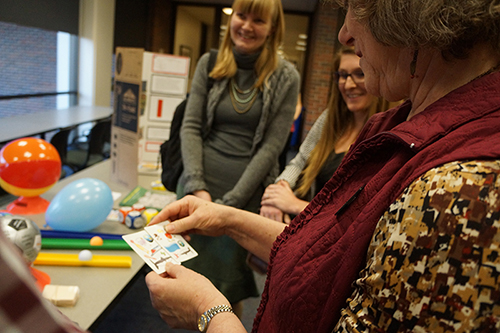
University of Arkansas graduate students in counselor education are taking adventure therapy programs into local schools with the goal of helping students build self-esteem and self-efficacy, both of which contribute to more academic success.
David Christian established the Adventure Therapy Lab in the College of Education and Health Professions shortly after joining the faculty as an assistant professor in fall of 2015. The lab and curriculum are part of the counselor education program in the college training both school and community mental health professionals.
The adventure therapy lab is not so much a physical space in which to work as it is a source of materials and information that students can practice using on campus and take to internship sites and training sessions for teachers and school counselors.
Master's students in counselor education presented posters with data from projects they did during their internships this semester. They invited faculty and other students to view the posters Nov. 29 in the Graduate Education Building.
Calvin Clark completed an internship at a local intermediate school of fourth- and fifth-graders. Children were referred to his adventure therapy program by homeroom teachers and the school counselor. The program was also designed to help students improve their social interaction with peers.
Adventure therapy is an approach to group counseling that uses action and experiences to facilitate client growth. Activities range from hiking in the wilderness to games traditionally played in physical education classes.
Clark said he focused on activities to help the students, not only build relationships with each other, but also to take what they learn from the activities and apply it outside the classroom.
"The activity serves as a metaphor for what an individual is struggling with," Christian explained. "They do an activity and then process it in terms of the metaphor."
The activities Clark used require teamwork and good communication, he said. One was called block party in which students must use only a body part such as their fingertips or elbows to lift and suspend wooden blocks and they can't talk to one another. It teaches them to solve problems together, he said. Students set goals for themselves before starting an activity and they reflect afterward on how what they learned could be beneficial to them.
He gave the students a survey before they participated in the adventure therapy program and again afterward to measure their self-efficacy. Self-efficacy refers to belief in one's ability to succeed in specific situations or accomplish a task. The pre- and post-tests, along with teacher evaluations, showed improvements, Clark said.
A former special education teacher, Clark decided to pursue a master's degree to become a school counselor to advocate for those students who are on the cusp of being placed in a therapeutic facility.
"It is my hope that, through working with teachers and staff on implementing behavior interventions and developing more positive relationships with those students, they will be able to remain in the public school environment," Clark said.
Kailee Stonebarger worked with students one-on-one at a junior high school and with groups at an elementary school. In her experience, boys had more difficulty talking about their challenges than girls and she found that adventure therapy was a good processing tool for boys when that was the case.
"Activities related to their life experiences," she said.
For her, she prefers the active nature of adventure therapy when compared to sitting in an office talking to students. Adventure therapy can be used in many settings, not just schools, Stonebarger said. She helped at a table displaying games and props that could be used but said many activities can be done with no equipment or with inexpensive household items.
She and Jen Hartman, another school counseling intern, helped put on a workshop for members of the Northwest Arkansas School Counselor Association, which resulted in an invitation to present a training session to teachers at a local school district.
Christian said adventure therapy activities can be used with all ages to help teachers get to know students better and for students to feel more comfortable and ready to participate in class.
"I've visited some University Perspectives classes to do activities," he said about mandatory classes for freshmen at the U of A designed to enhance student success. "One instructor said his students had never talked that much in class."
Topics
Contacts
Heidi S. Wells, director of communications
College of Education and Health Professions
479-575-3138, heidisw@uark.edu